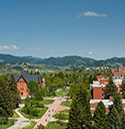Human Development and Family Science
The human development and family science option is an interdisciplinary program that prepares students for careers working with individuals and families. The program focuses on the social-emotional, physical, mental, spiritual, cultural, and societal aspects of human development across the lifespan (infancy, middle childhood, adolescence, adulthood, and late adulthood). Individuals develop in family contexts, and this program integrates the in-depth study of the family as a dynamic social unit. The program focuses on family behavior, strengths, and challenges using family-specific theoretical frameworks (family systems, family crisis) and research methods. Social, cultural, historical, political, and economic trends that influence family functioning and well-being are addressed. Students study a wide range of family issues including relational dynamics, parenting, human response to stress and crisis, family policies and laws, family finance and economics, work and family issues, and human services delivery and decision-making.
The human development and family science option provides a strong background for students seeking careers in human services, family life education, family policy, and financial counseling. The curriculum prepares students to work in a wide range of organizations and settings (community-based social services, family intervention, business, government and public policy, faith-based organizations, healthcare and family wellness, and non-profit organizations). The degree program also prepares students to be strong candidates for graduate programs in marriage and family therapy, counseling, family financial planning, human development, family science, social work, law, and other related behavioral and social science disciplines.
Students completing the degree may apply for provisional certification as a Certified Family Life Educator. MSU's human development and family science major (formerly known as family and consumer sciences major) is accredited by the National Council on Family Relations. Provisional certification is awarded at the completion of a baccalaureate degree and course work in the 11 family life substance areas. After two years' work experience, the student may apply for full CFLE certification. Students are also encouraged to complete the courses required to take a national exam for the certification as an Accredited Financial Counselor (HDFS 337, HDFS 338, and HDFS 339).
Students must receive a grade of "C" or higher in all required courses as outlined in the major.








